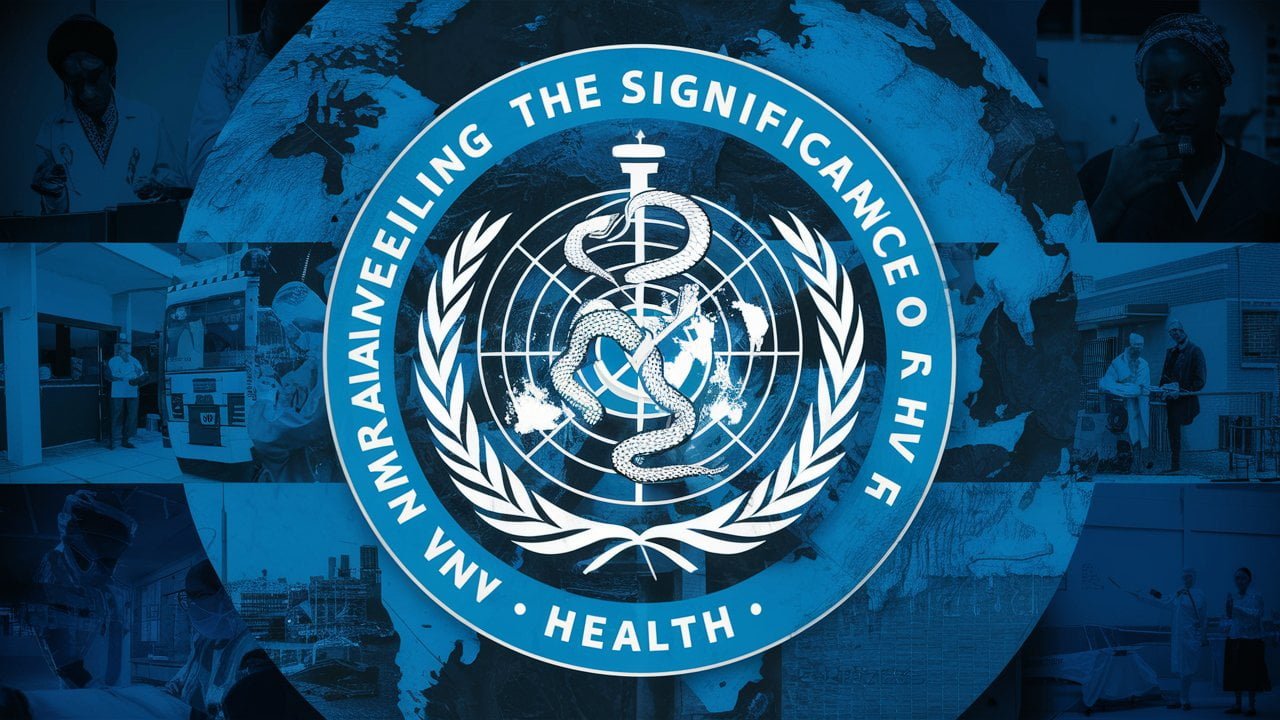The realm of global health governance is a complex landscape where the World Health Organization (WHO) stands as a beacon of authority, guiding international efforts towards better public health outcomes.
In the intricate web of policies and initiatives that drive healthcare systems worldwide, understanding the pivotal role played by WHO becomes paramount. This article seeks to unravel the significance of WHO in the realm of health, shedding light on its multifaceted functions that shape not only national but also international healthcare agendas.
As we delve into WHO’s mandate as a specialized agency of the United Nations, it becomes evident how this institution acts as a linchpin for coordinating diverse global health endeavors. From setting standards and norms to monitoring health trends on a worldwide scale, WHO meticulously crafts frameworks that underpin the very fabric of modern healthcare policy-making.
The intricacies within which WHO operates extend beyond routine affairs and encompass rapid response mechanisms during crises such as pandemics or natural disasters — further solidifying its indispensable position in safeguarding public health interests globally.
By exploring WHO’s operational dynamics in these contexts, one can appreciate the gravity of its impact on steering health governance paradigms towards resilience and preparedness.
In dissecting the nuanced interplay between WHO’s guidance and global health policies, this article aims to provide a comprehensive vista into how evidence-based recommendations serve as catalysts for transformative changes in healthcare systems across borders.
Cardinally shaping strategies to combat prevailing challenges like noncommunicable diseases or infectious outbreaks, WHO emerges not merely as an advisor but as a driving force behind coordinated policy implementations that aim at fostering equitable access to healthcare services and fortifying public health security measures.
Through juxtaposing theoretical constructs with practical applications at both macro and micro levels, this discourse elucidates how WHO metamorphoses theoretical propositions into tangible improvements in global health outcomes — unveiling a narrative rich in technical precision and innovation-driven solutions awaiting exploration.
Understanding WHO’s Role in Health Governance.
The World Health Organization (WHO), established in 1948, operates as a specialized agency of the United Nations, entrusted with the mission to promote health, monitor global health trends, and provide technical assistance to countries. This mandate extends to coordinating international efforts aimed at improving public health outcomes worldwide.
One foundational aspect of WHO’s governance role lies in setting norms and standards for health practices globally. By establishing guidelines and recommendations on critical health issues such as vaccination protocols or disease prevention strategies, WHO ensures a unified approach to addressing health challenges across borders.
In the realm of crisis response, WHO plays a pivotal role in facilitating rapid interventions during emergencies like pandemics or natural disasters. For instance, during the Ebola outbreak in West Africa, WHO swiftly mobilized resources and expertise to support affected nations in containing the spread of the virus and mitigating its impact.
Such emergency responses underscore the significance of WHO’s operational readiness and capacity to coordinate multifaceted efforts across various stakeholders to combat health crises effectively.
Furthermore, beyond crisis management, WHO’s monitoring systems enable real-time surveillance of global health trends. By tracking disease outbreaks, analyzing epidemiological data, and sharing timely information with member states, WHO contributes substantially to enhancing preparedness for emerging health threats.
The organization’s robust monitoring mechanisms not only inform evidence-based decision-making but also serve as early warning systems that aid in preventing the escalation of potential public health crises on a global scale.
In essence, by delving into understanding how WHO functions within the spectrum of health governance—from norm-setting to emergency responses—stakeholders gain valuable insights into the organization’s multifaceted roles that underpin its significance in shaping global public health policies and initiatives.
The coordinated efforts led by WHO resonate profoundly in promoting sustainable healthcare systems worldwide while fostering resilience against unforeseen health challenges that transcend geographical boundaries.
Influencing Global Health Policies.
The World Health Organization (WHO) serves as a prominent influencer in shaping global health policies through evidence-based recommendations. By synthesizing research findings and expert opinions, WHO provides invaluable guidance to member states on policy development both nationally and internationally.
For instance, when addressing the rising burden of noncommunicable diseases worldwide, WHO actively promotes preventive strategies like tobacco control measures or healthy lifestyle interventions based on data-driven approaches. This evidence-based approach not only informs policy decisions but also fosters consistency and best practices across diverse healthcare systems.
Furthermore, WHO plays a pivotal role in developing comprehensive global health strategies tailored to address prevalent health challenges such as infectious disease outbreaks.
Through collaborative efforts with governments and public health agencies, WHO formulates guidelines and frameworks that outline preemptive measures for early detection, containment, and management of contagious diseases.
Take the example of the International Health Regulations (IHR), a legal instrument created by WHO to enhance global surveillance and response capacities during public health emergencies like the COVID-19 pandemic. These frameworks illustrate how WHO’s proactive stance in policy formulation is crucial for ensuring effective preparedness and response mechanisms on a global scale.
Collaboration between WHO and member states is instrumental in translating policy recommendations into actionable initiatives that safeguard public health security while promoting equitable access to healthcare services.
By working closely with countries at different socio-economic levels, WHO assists in tailoring policies that address specific needs within diverse populations – ranging from bolstering primary care services in low-resource settings to implementing vaccination campaigns in high-risk areas.
This partnership approach reinforces the importance of inclusivity, sustainability, and equity within healthcare systems worldwide, aligning efforts towards achieving universal health coverage as outlined under the Sustainable Development Goals (SDGs).
Impact on Healthcare Systems.
The World Health Organization (WHO) plays a crucial role in impacting healthcare systems globally by providing guidance that strengthens the foundation of healthcare delivery. Through its capacity-building programs, WHO facilitates training initiatives for healthcare professionals worldwide, ensuring that they have the necessary skills and knowledge to address public health challenges effectively.
By leveraging its expertise and resources, WHO supports countries in developing sustainable healthcare infrastructure that can withstand various health threats.
Partnerships between WHO and other organizations significantly enhance the delivery of healthcare services in underserved communities. For instance, collaborations with non-governmental organizations (NGOs) or international agencies enable the mobilization of resources to areas lacking adequate medical facilities or personnel.
These partnerships not only improve access to essential health services but also contribute to better health outcomes among vulnerable populations. By working together towards common goals, these partnerships amplify the impact of interventions aimed at reducing disparities in healthcare access.
Countries aligning their health priorities with WHO objectives benefit from a systematic approach that leads to sustainable progress towards achieving universal health coverage. For example, nations that prioritize primary healthcare as recommended by WHO often witness improved health indicators and better healthcare outcomes for their populations.
By following evidence-based guidelines and frameworks set forth by WHO, countries can optimize their healthcare systems to ensure equitable access to quality care for all citizens. This alignment fosters a unified effort towards achieving comprehensive health coverage as outlined in global health agendas.
Advancing Research & Innovation.
The World Health Organization (WHO) plays a pivotal role in advancing research and innovation in global health. Through fostering research collaborations, WHO brings together experts from various countries to tackle pressing health challenges collectively.
For instance, in the fight against infectious diseases like malaria, WHO collaborates with leading research institutions and pharmaceutical companies to develop new treatment strategies and vaccines that can benefit populations worldwide. By pooling resources and expertise, WHO catalyzes innovation that has far-reaching implications for public health outcomes globally.
One significant contribution of WHO is seen in its support for research on emerging diseases. During outbreaks such as the COVID-19 pandemic, WHO works closely with scientists and public health agencies to conduct epidemiological studies, develop diagnostic tools, and identify treatment options.
By investing in research efforts at both national and international levels, WHO not only aids in containment strategies but also enhances preparedness for future health crises.
Moreover, through vaccination campaigns like those initiated against polio or measles, WHO demonstrates its commitment to eradicating preventable diseases through evidence-based interventions that save lives and improve population health.
In embracing the digital era, WHO drives innovation by harnessing technology to address healthcare disparities among remote populations. Leveraging telemedicine solutions, mobile health applications, and data analytics tools, WHO ensures that even underserved communities have access to essential healthcare services.
For example, initiatives like teleconsultations for rural clinics or using drones for medical supply deliveries showcase how technology can bridge gaps in healthcare delivery. By promoting digital health solutions globally, WHO empowers countries to enhance their healthcare systems efficiently while reaching those most in need of medical assistance.
Ensuring Public Health Preparedness.
In the realm of public health preparedness, the World Health Organization (WHO) stands as a pivotal entity in fortifying global defenses against unforeseen health crises. By bolstering surveillance systems, WHO enhances the early detection of potential outbreaks, enabling swift responses to mitigate their impact.
For instance, during the Ebola outbreak in West Africa, WHO’s robust surveillance mechanisms facilitated timely reporting and containment efforts, preventing further escalation of the crisis.
Additionally, WHO plays a crucial role in coordinating international responses to major health emergencies like the Zika virus outbreak. Through the deployment of expert teams and rapid mobilization of resources, WHO aids affected regions in mounting effective response measures.
The organization’s ability to swiftly provide technical assistance not only aids in containing outbreaks but also helps build local capacities for future resilience against similar threats.
An essential aspect of WHO’s work in public health preparedness is its emphasis on learning from past experiences to enhance future readiness. By integrating lessons gleaned from previous crises into preparedness plans, WHO assists countries and regions in bolstering their defenses against emerging epidemics or health threats.
This strategic approach ensures that each response effort becomes an opportunity for continuous improvement and refinement of global public health emergency management strategies.
Conclusion.
In conclusion, the World Health Organization (WHO) stands as a cornerstone in the realm of global public health governance. Its multifaceted role, from setting norms and standards to responding swiftly to emergencies, underscores its paramount significance in shaping health policies worldwide.
By influencing policy-making processes at various levels, fostering research collaborations, strengthening healthcare systems, and ensuring public health preparedness, WHO champions the advancement of sustainable development goals and equitable access to quality healthcare services.
The collaborative nature of WHO’s work emphasizes the interconnectedness among stakeholders in achieving optimal public health outcomes. Through strategic partnerships with member states, organizations, and communities, WHO navigates intricate health landscapes with precision and foresight.
As we navigate through evolving health challenges and emerging threats, the continued support for WHO’s initiatives and mandates becomes imperative for building resilient healthcare systems that safeguard populations globally.
Embracing the ethos of collective action and shared responsibility is pivotal in harnessing the full potential of WHO’s contributions towards a healthier future for all.




